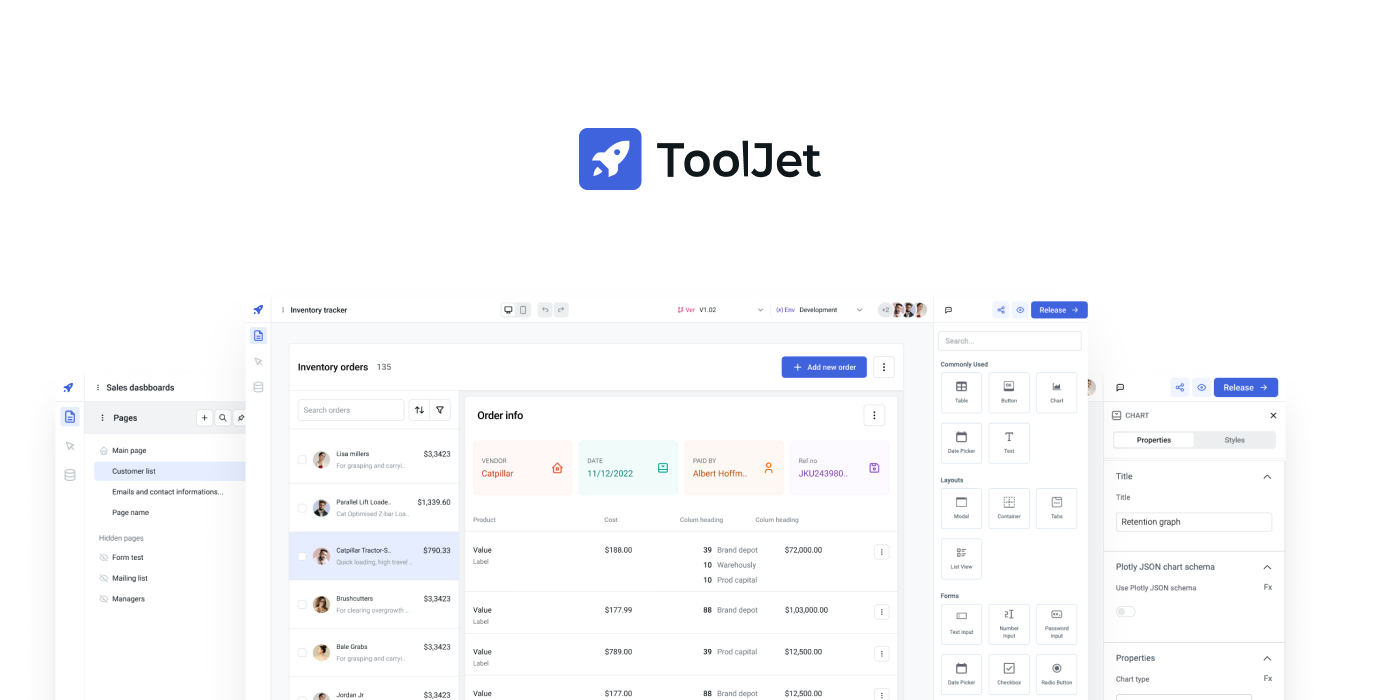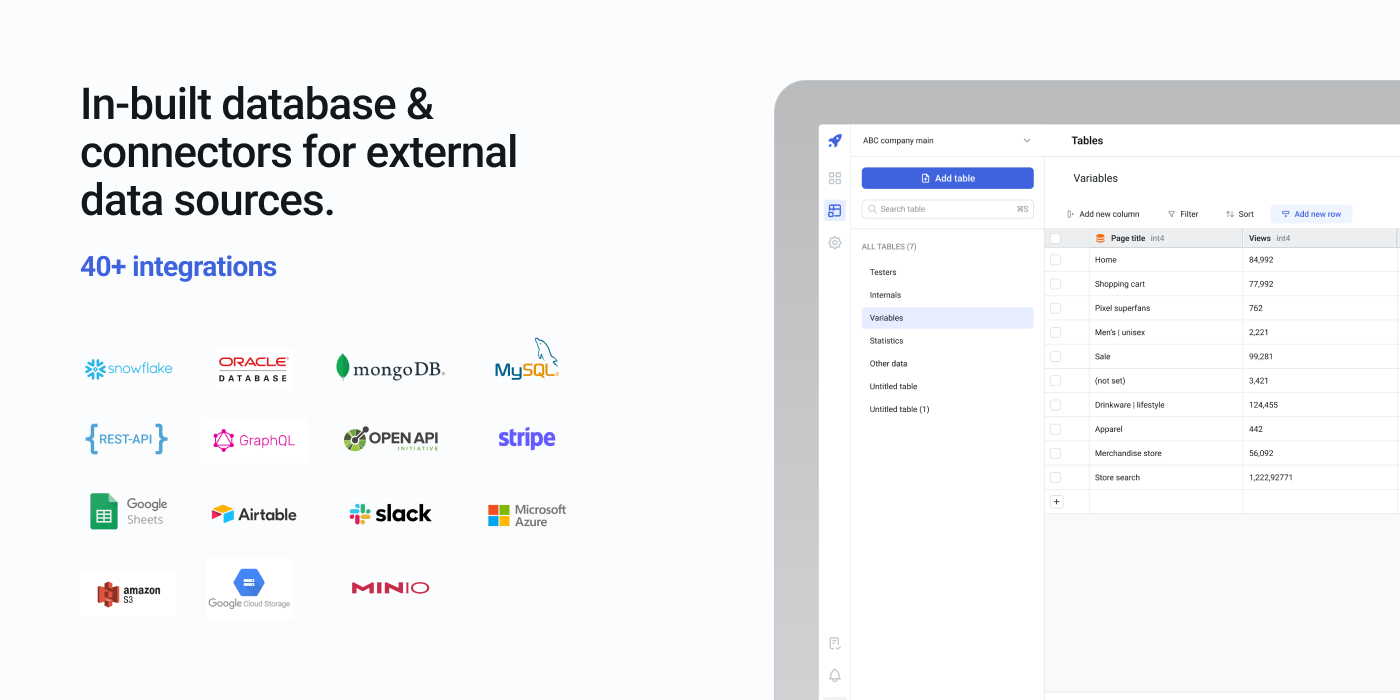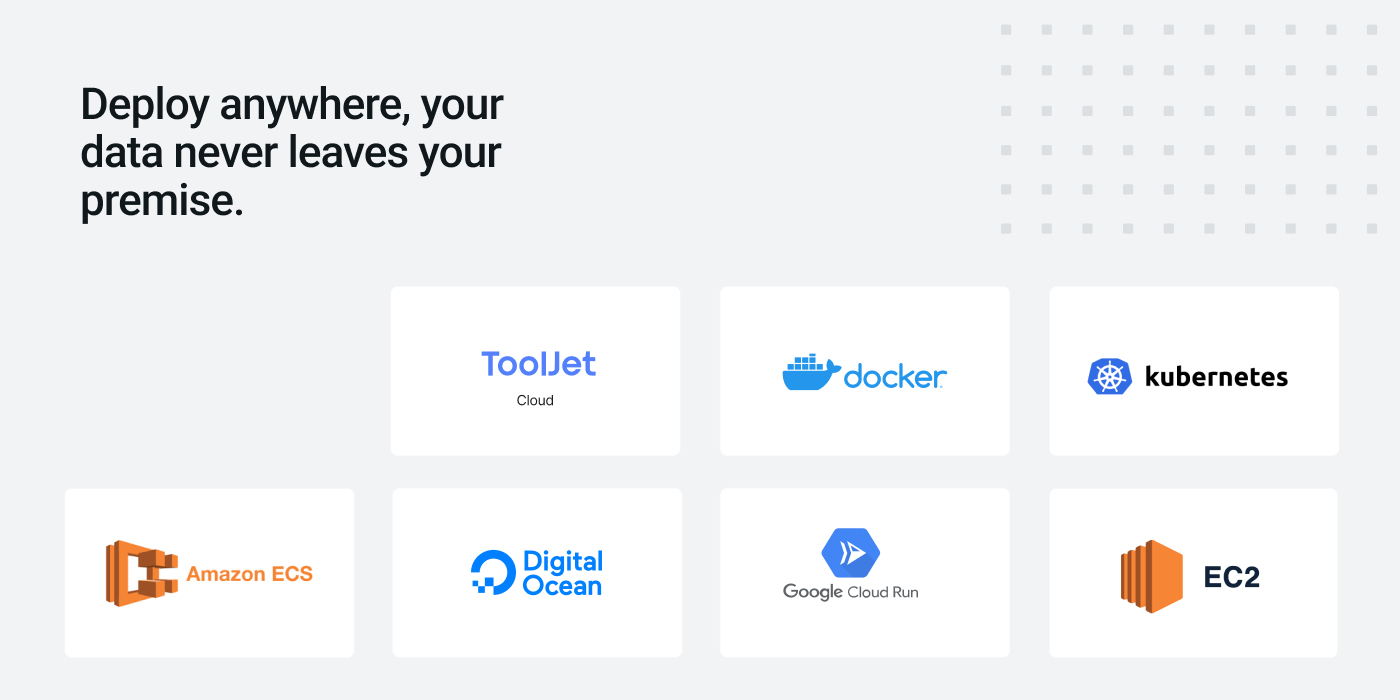ToolJet is an open-source low-code framework to build and deploy internal tools quickly with minimal engineering effort. ToolJet's drag and drop frontend builder allows you to build complicated responsive frontends within minutes. You can also connect to your data sources, such as databases ( PostgreSQL, MongoDB, Elasticsearch & more), API endpoints (ToolJet supports importing OpenAPI spec & OAuth2 authorization), SaaS tools (Stripe, Slack, Google Sheets, Airtable, Notion & more) and object storage services ( S3, GCS, Minio, etc ) to fetch and write data.
All features
- Visual app builder: 40+ built-in responsive widgets such as Tables, Charts, Lists, Forms, Progressbars, and more.
- ToolJet Database: In-built no-code database.
- Multi-Page: Build an application with as many pages as you want.
- Multiplayer editing: multiple users can use the app builder at the same time.
- 40+ data sources: connect to external databases, cloud storages and APIs.
- Desktop & mobile: layout widths can be customised to support different screens.
- Self-host: (supports Docker, Kubernetes, Heroku, AWS EC2, Google Cloud Run, and more).
- Collaborate: add comments anywhere on the canvas and tag your team members.
- Extend with plugins: use our commandline tool to easily bootstrap new connectors.
- Version control: every application have different versions with proper release cycle.
- Run JS & Python code: ability custom JavaScript & Python snippets
- Granular access control on group-level and app-level.
-
Low-code: write JS code almost anywhere in the builder. For example, the color property of text can be set to
status === 'success' ? 'green' : 'red' - No-code query editors: for all supported data sources.
- Join and transform data: transform query results using just JavaScript/Python code.
-
Secure: All the credentials are securely encrypted using
aes-256-gcm. - Doesn't store data: ToolJet acts only as a proxy and doesn't store any data.
- SSO: Supports multiple SSO providers
Quickstart
The easiest way to get started with ToolJet is by creating a ToolJet Cloud account. ToolJet Cloud offers a hosted solution of ToolJet. If you want to self-host ToolJet, kindly proceed to deployment documentation.
You can deploy ToolJet on Heroku for free using the one-click-deployment button only until 28th November 2022.
Try using Docker
Want to give ToolJet a quick spin on your local machine? You can run the following command from your terminal to have ToolJet up and running right away.
docker run \
--name tooljet \
--restart unless-stopped \
-p 80:80 \
-v tooljet_data:/var/lib/postgresql/13/main \
tooljet/try:latestTutorials and examples
GitHub contributor leaderboard using ToolJet
Cryptocurrency dashboard using ToolJet
WhatsApp CRM using ToolJet
AWS S3 file explorer
Documentation
Documentation is available at https://docs.tooljet.com.
Self-hosted
You can use ToolJet cloud for a fully managed solution. If you want to self-host ToolJet, we have guides on deploying ToolJet on Kubernetes, AWS EC2, Docker, Heroku and more.
| Provider | Documentation |
|---|---|
| AWS EC2 | Link |
| AWS EKS (Kubernetes) | Link |
| AWS ECS | Link |
| GCP GKE (Kubernetes) | Link |
| Azure AKS (Kubernetes) | Link |
| Heroku | Link |
| Docker | Link |
| Google Cloud Run | Link |
Community support
For general help using ToolJet, please refer to the official documentation. For additional help, you can use one of these channels to ask a question:
- Slack - Discussions with the community and the team.
- GitHub - For bug reports and feature requests.
- Twitter - Get the product updates easily.
Roadmap
Check out our roadmap to get informed of the latest features released and the upcoming ones.
Branching model
We use the git-flow branching model. The base branch is develop. If you are looking for a stable version, please use the main branch or tags labeled as v1.x.x.
Contributing
Kindly read our Contributing Guide to learn and understand about our development process, how to propose bug fixes and improvements, and how to build and test your changes to ToolJet.
Contributors
License
ToolJet © 2022, ToolJet Solutions Inc - Released under the GNU Affero General Public License v3.0.














